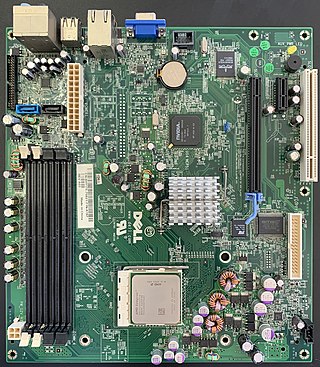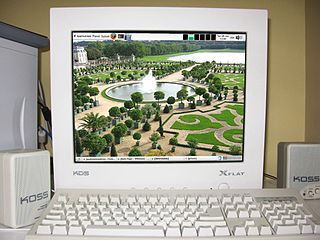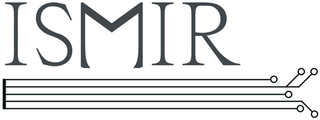The Association for Computing Machinery (ACM) is a US-based international learned society for computing. It was founded in 1947 and is the world's largest scientific and educational computing society. The ACM is a non-profit professional membership group, reporting nearly 110,000 student and professional members as of 2022. Its headquarters are in New York City.

Computing is any goal-oriented activity requiring, benefiting from, or creating computing machinery. It includes the study and experimentation of algorithmic processes, and the development of both hardware and software. Computing has scientific, engineering, mathematical, technological, and social aspects. Major computing disciplines include computer engineering, computer science, cybersecurity, data science, information systems, information technology, and software engineering.

Computer science is the study of computation, information, and automation. Computer science spans theoretical disciplines to applied disciplines.
Information retrieval (IR) in computing and information science is the task of identifying and retrieving information system resources that are relevant to an information need. The information need can be specified in the form of a search query. In the case of document retrieval, queries can be based on full-text or other content-based indexing. Information retrieval is the science of searching for information in a document, searching for documents themselves, and also searching for the metadata that describes data, and for databases of texts, images or sounds.
Software engineering is an engineering approach to software development. A practitioner, called a software engineer, applies the engineering design process to develop software.

Computer engineering is a branch of computer science and electronic engineering that integrates several fields of computer science and electronic engineering required to develop computer hardware and software. Computer engineering is referred to as computer science and engineering or Electrical and Computer engineering at some universities
An information system (IS) is a formal, sociotechnical, organizational system designed to collect, process, store, and distribute information. From a sociotechnical perspective, information systems comprise four components: task, people, structure, and technology. Information systems can be defined as an integration of components for collection, storage and processing of data, comprising digital products that process data to facilitate decision making and the data being used to provide information and contribute to knowledge.
Theoretical computer science is a subfield of computer science and mathematics that focuses on the abstract and mathematical foundations of computation.
The following outline is provided as an overview of and topical guide to human–computer interaction:
Human-centered computing (HCC) studies the design, development, and deployment of mixed-initiative human-computer systems. It is emerged from the convergence of multiple disciplines that are concerned both with understanding human beings and with the design of computational artifacts. Human-centered computing is closely related to human-computer interaction and information science. Human-centered computing is usually concerned with systems and practices of technology use while human-computer interaction is more focused on ergonomics and the usability of computing artifacts and information science is focused on practices surrounding the collection, manipulation, and use of information.

Human–computer interaction (HCI) is research in the design and the use of computer technology, which focuses on the interfaces between people (users) and computers. HCI researchers observe the ways humans interact with computers and design technologies that allow humans to interact with computers in novel ways. A device that allows interaction between human being and a computer is known as a "Human-computer Interface (HCI)".
Informatics is the study of computational systems. According to the ACM Europe Council and Informatics Europe, informatics is synonymous with computer science and computing as a profession, in which the central notion is transformation of information. In some cases, the term "informatics" may also be used with different meanings, e.g. in the context of social computing, or in context of library science.

The International Society for Music Information Retrieval (ISMIR) is an international forum for research on the organization of music-related data. It started as an informal group steered by an ad hoc committee in 2000 which established a yearly symposium - whence "ISMIR", which meant International Symposium on Music Information Retrieval. It was turned into a conference in 2002 while retaining the acronym. ISMIR was incorporated in Canada on July 4, 2008.

Data science is an interdisciplinary academic field that uses statistics, scientific computing, scientific methods, processing, scientific visualization, algorithms and systems to extract or extrapolate knowledge and insights from potentially noisy, structured, or unstructured data.

An infobox is a digital or physical table used to collect and present a subset of information about its subject, such as a document. It is a structured document containing a set of attribute–value pairs, and in Wikipedia represents a summary of information about the subject of an article. In this way, they are comparable to data tables in some aspects. When presented within the larger document it summarizes, an infobox is often presented in a sidebar format.

Saraju Mohanty is an Indian-American professor of the Department of Computer Science and Engineering, and the director of the Smart Electronic Systems Laboratory, at the University of North Texas in Denton, Texas. Mohanty received a Glorious India Award – Rich and Famous NRIs of America in 2017 for his contributions to the discipline. Mohanty is a researcher in the areas of "smart electronics for smart cities/villages", "smart healthcare", "application-Specific things for efficient edge computing", and "methodologies for digital and mixed-signal hardware". He has made significant research contributions to security by design (SbD) for electronic systems, hardware-assisted security (HAS) and protection, high-level synthesis of digital signal processing (DSP) hardware, and mixed-signal integrated circuit computer-aided design and electronic design automation. Mohanty has been the editor-in-chief (EiC) of the IEEE Consumer Electronics Magazine during 2016-2021. He has held the Chair of the IEEE Computer Society's Technical Committee on Very Large Scale Integration during 2014-2018. He holds 4 US patents in the areas of his research, and has published 500 research articles and 5 books. He is ranked among top 2% faculty around the world in Computer Science and Engineering discipline as per the standardized citation metric adopted by the Public Library of Science Biology journal.

Larry E. Druffel is an American engineer, Director Emeritus and visiting scientist at the Software Engineering Institute (SEI) at Carnegie Mellon University. He has published over 40 professional papers/reports and authored a textbook. He is best known for leadership in: (1) bringing engineering discipline and supporting technology to software design and development, and (2) addressing network and software security risks.
This glossary of computer science is a list of definitions of terms and concepts used in computer science, its sub-disciplines, and related fields, including terms relevant to software, data science, and computer programming.

Information engineering is the engineering discipline that deals with the generation, distribution, analysis, and use of information, data, and knowledge in systems. The field first became identifiable in the early 21st century.









